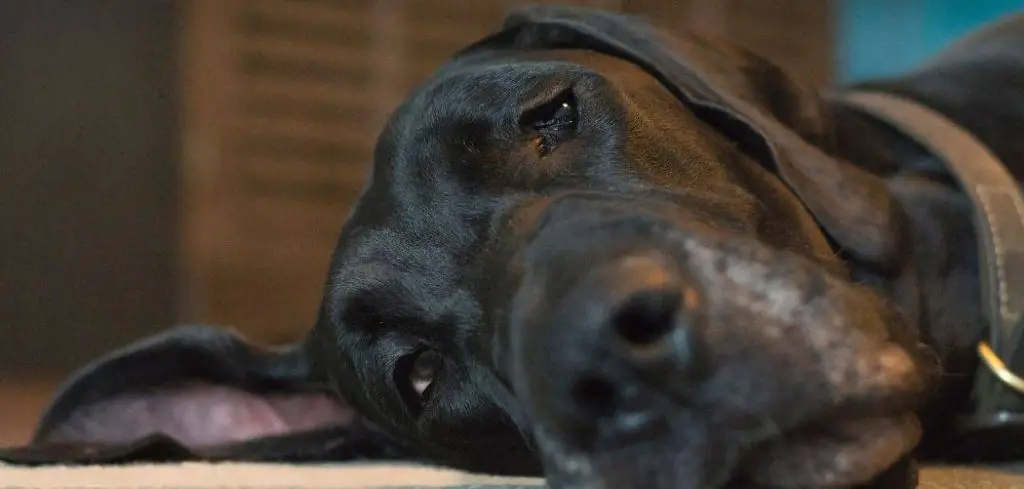It’s distressing to see your dog panting and pacing at night instead of resting peacefully.
These behaviors can disrupt both your dog’s sleep and your own, and they often signal underlying emotional or physical discomfort.
We outline the common causes of a dog panting and being anxious at night, what you can do at home, and when to seek veterinary help.
Dog Panting and Anxious at Night — Why It Happens
When dogs pant and appear anxious at night, it’s usually a response to stress, pain, or internal discomfort that worsens during quiet, inactive hours. Anxiety, age-related cognitive decline, gastrointestinal upset, medication side effects, or environmental triggers can all contribute to nighttime distress.
Dogs who are fine during the day may struggle at night due to lack of distractions, changes in routine, or worsening symptoms in the stillness of nighttime.
Identifying the cause requires careful observation and, in some cases, medical intervention.

Dog Panting and Anxious at Night: Common Causes
Separation Anxiety
Dogs that are deeply bonded to their humans may feel heightened anxiety at night when left alone.
If your dog tends to cling to you during the day or becomes distressed when you’re gone, nighttime separation can be particularly hard.
They may pant, pace, whine, scratch at doors, or bark excessively.
This type of anxiety can build gradually over time or surface after a change in routine, like a new work schedule or recent travel.
Read more: Dog Panting and Acting Nervous (What’s causing the strange behavior?)
Cognitive Dysfunction (Canine Dementia)
Older dogs suffering from cognitive decline may show signs of confusion, anxiety, and restlessness after sunset.
Panting at night is common in dogs with dementia, often accompanied by pacing, vocalizing, or staring at walls.
This condition, sometimes compared to Alzheimer’s in humans, can disrupt sleep cycles and cause agitation during the night.
Owners may notice these symptoms become more pronounced in the evening, a phenomenon known as sundowning.
Gastrointestinal Discomfort
A dog experiencing nausea or digestive upset may become restless and pant more at night.
An empty stomach in the early morning hours or recent dietary changes can trigger discomfort.
Look for signs like drooling, lip licking, burping, or signs of bloating.
Some dogs may get up frequently, refuse to lie down, or appear generally uneasy.
Medication Side Effects
If your dog recently started or changed medications, panting and anxiety may be listed among the side effects.
Common culprits include corticosteroids, certain pain medications, and even some anti-seizure drugs.
These reactions may appear more intense at night if the dose is given in the evening or if your dog is more sensitive when resting.
Always consult your veterinarian before making changes to a medication regimen.
Noise Sensitivity or Environmental Stress
Dogs are acutely attuned to sounds we might not notice—like distant sirens, wildlife, or even wind.
At night, when the home is quieter, these noises can stand out more and trigger anxiety.
Panting may be your dog’s way of coping with a perceived threat, especially if paired with trembling, hiding, or pacing.
Even subtle shifts in temperature, lighting, or furniture placement can create stress in sensitive dogs.
What to Do If Your Dog Is Panting and Anxious at Night
Begin by creating a calm and consistent nighttime routine. Dogs thrive on predictability, so aim to walk, feed, and settle your dog at the same times each evening.
Make sure your dog has a comfortable, quiet sleeping area with familiar bedding and toys.
Soft background noise, like white noise machines or calming music, can help reduce startle responses to ambient noises.
Consider a short walk or bathroom break before bed to reduce restlessness.
Some dogs also benefit from a small late-night snack to ease hunger-related nausea.
If your dog suffers from anxiety, calming supplements, pheromone diffusers, or anxiety wraps may provide relief. Speak to your vet about safe options.
Keep track of the frequency and pattern of symptoms. This information is essential if the behavior continues and veterinary support is needed.
When to Call or Visit Your Vet
You should contact your vet if the panting and nighttime anxiety are sudden, intense, or interfere with your dog’s quality of life.
If your dog shows additional signs like vomiting, diarrhea, trembling, or appears confused and disoriented, seek veterinary advice.
A visit is also recommended if symptoms worsen over time, especially in older dogs or those with chronic medical conditions.
Medication side effects, digestive distress, or undiagnosed pain may require adjustments or new treatment plans.
Emergency care is needed if your dog exhibits rapid breathing, pale gums, collapse, or signs of toxin exposure.
Read more: Dog Panting and Licking Lips at Night (Why it happens)
Key Takeaway
If your dog is panting and anxious at night, it’s likely more than just restlessness — it’s a signal that something is wrong or uncomfortable.
Pay close attention to when the behavior starts, what might trigger it, and how it progresses. Support your dog with a calm environment and reach out to your vet when needed.
Your dog depends on you for comfort and care — responding early can help restore peace to your evenings and theirs.
